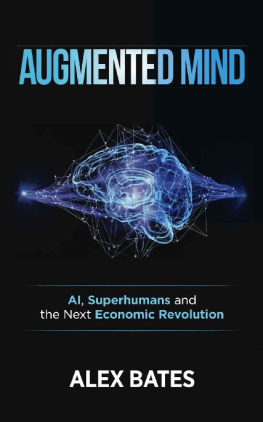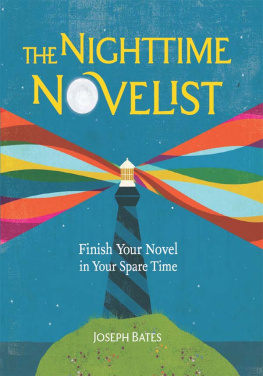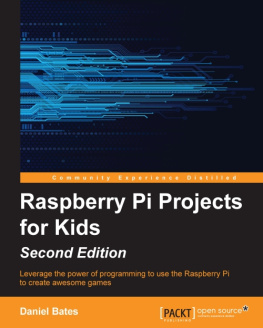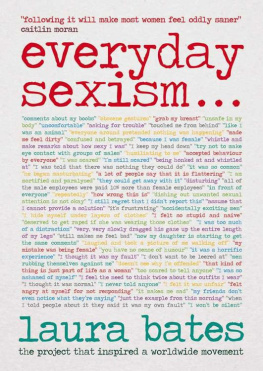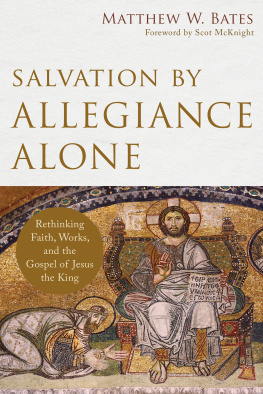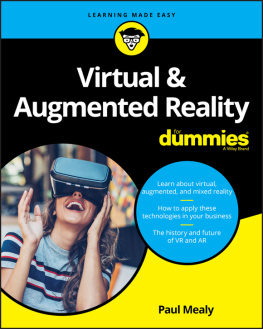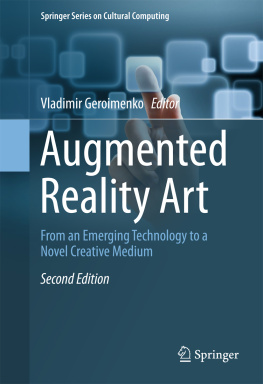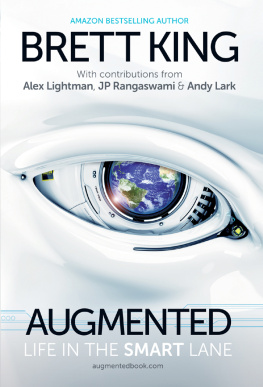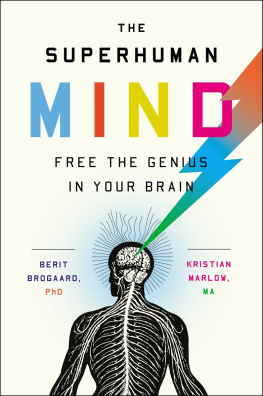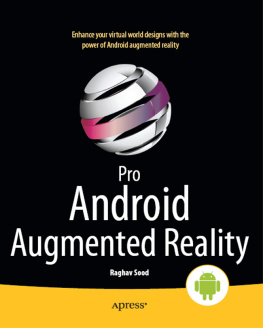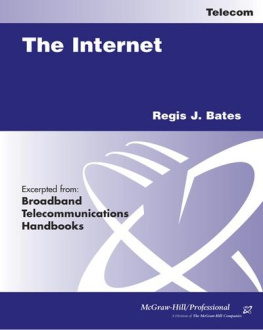Bates - Augmented mind: AI, humans and the superhuman revolution
Here you can read online Bates - Augmented mind: AI, humans and the superhuman revolution full text of the book (entire story) in english for free. Download pdf and epub, get meaning, cover and reviews about this ebook. year: 2018, publisher: Neocortex Press, genre: Romance novel. Description of the work, (preface) as well as reviews are available. Best literature library LitArk.com created for fans of good reading and offers a wide selection of genres:
Romance novel
Science fiction
Adventure
Detective
Science
History
Home and family
Prose
Art
Politics
Computer
Non-fiction
Religion
Business
Children
Humor
Choose a favorite category and find really read worthwhile books. Enjoy immersion in the world of imagination, feel the emotions of the characters or learn something new for yourself, make an fascinating discovery.
- Book:Augmented mind: AI, humans and the superhuman revolution
- Author:
- Publisher:Neocortex Press
- Genre:
- Year:2018
- Rating:5 / 5
- Favourites:Add to favourites
- Your mark:
- 100
- 1
- 2
- 3
- 4
- 5
Augmented mind: AI, humans and the superhuman revolution: summary, description and annotation
We offer to read an annotation, description, summary or preface (depends on what the author of the book "Augmented mind: AI, humans and the superhuman revolution" wrote himself). If you haven't found the necessary information about the book — write in the comments, we will try to find it.
Bates: author's other books
Who wrote Augmented mind: AI, humans and the superhuman revolution? Find out the surname, the name of the author of the book and a list of all author's works by series.
Augmented mind: AI, humans and the superhuman revolution — read online for free the complete book (whole text) full work
Below is the text of the book, divided by pages. System saving the place of the last page read, allows you to conveniently read the book "Augmented mind: AI, humans and the superhuman revolution" online for free, without having to search again every time where you left off. Put a bookmark, and you can go to the page where you finished reading at any time.
Font size:
Interval:
Bookmark:
Chasing Epiphanies
How Augmenting Human Intuition and Artificial Intelligence will Spark the Next Economic Revolution
By Alex Bates
Copyright 2018 Neocortex Ventures
All rights reserved
You may not realize it, but we are standing at the brink. The brink of amazement. The brink of revolution. Insanely great times lie ahead. We are on the verge of becoming superhuman.
If there is a fork in the road, with one path heading toward destruction and extinction, this book is about the other path--to enlightenment, fulfillment, and the meaning of life and the universe.
With so many of us wasting away our time doing low level, unfulfilling work, we are failing to tap into our amazing potential. The biggest problems facing the earth and humanity could be solved if we were able to unleash that potential, in areas such as climate change, oil spills, nuclear catastrophes, environmental degradation, and poverty.
The combination of AI with human intelligence -- which I call Intelligence Augmentation -- or IA -- has revolutionary potential. IA has the potential to help us eliminate scarcity and bring about abundance, allowing us to lead fulfilled lives and answer fundamental questions.
I will share the hard science and human stories that are a part of the IA revolution. Stories from my own company, Mtell, where I spent a decade on the front lines, facilitating the collaboration of humans and AI. Stories from other AI technologists who I brought together into a mastermind network (www.GlobalMind.ai). Stories from people with unique gifts in domains ranging from mathematics to music, art, and design--people who exemplify the unmeasurable capabilities of the human mind. These stories of pioneers and their work will illuminate the revolutionary potential of IA.
AI has come a long way since the term was coined in the 1960s. We have self-driving cars, automated photo tagging, and robots that can do backflips. However, despite progress in certain areas, advances have slowed in recent years.
After a decade building an AI company, I came to understand why. The missing link seemed almost obvious in retrospect. Since the early days of computer science, it has been common knowledge that tasks that were easy for humans were difficult for computers, and tasks that were easy for computers were difficult for humans. AI can methodically sift through mountains of data, searching for low-level patterns or performing repetitive calculations; or it can search through trillions of possible combinations of moves and countermoves in a game. Humans arent good at performing such mundane repetitive search tasks for weeks on end without getting distracted or forgetting where we left off. But we have an amazing ability to make intuitive leaps, or meld ideas in unexpected ways, which can lead to revelations that we call epiphanies or eureka moments. Todays AI systems cant make those leaps. State-of-the-art AI systems, in spite of recent advances in deep learning, are still really just performing sophisticated pattern-matching.
So, we have human and artificial intelligence, two powerful intelligence models that are capable of essential, useful, extraordinary cognition in different arenas. In mathematical terms, these are complementary concepts. In human terms, their relationship is symbiotic, just like the scene in Jerry Maguire , where Tom Cruise bursts into the room and announces to Renee Zellweger, You complete me!
AI and human intelligence have the potential to complete each other. People have common-sense knowledge about the world, which AI lacks, as is readily apparent when interacting with Alexa and Siri. Human intuition is a trait or ability that scientists are still struggling to quantify, even though many people rely on its adept--if not mysterious--application. AI cant intuit a solution or work creatively the way a human mind can. The human mind cant mine data and read patterns the way AI can. What if we could free ourselves to spend more of our time creatively, in pursuit of epiphany moments that lead to breakthroughs, help us make an impact, and lead fulfilling lives. What are we waiting for? Humans and AI are a perfect combination.
At my company, Mtell, where my colleagues and I created systems to solve and avert crises in the manufacturing sector, I saw first-hand how human operators and mechanics added value and insights that were outside the AI system. I also saw how the AI system detected complex patterns and provided insights that humans could not see. Over the next ten years, we grew the company from a scrappy startup to a sophisticated company that was acquired by AspenTech in 2016. Throughout, I was consistently struck by the many ways in which human and AI capabilities are complementary.
So one might think that technologists, research scientists and investors are naturally scrambling to team up human beings with AI, to work in tandem. But that is not happening. In 2018, efforts in this area represent a tiny fraction of the total research and application focus in the fields of AI and machine learning. What little research has been done focuses primarily on physical tasks such as hybrid firefighting, driving cars, or battlefield warfare; or on simplistic virtual assistants.
While we have a term for the standalone, synthetic-replication approach, which is AI (artificial intelligence), we have no word for the combined, enhanced approach that I propose, which is different from hybrid intelligence, human agent collaboration, intelligence amplification, and augmented intelligence. In this book, I will use the term intelligence augmentation (IA), or Augmentation for short, for this combined approach, one that is capable of so much more, that we can and should be pouring resources into it. With luck, it will become formally accepted, which would help solve the Tower of Babel issue we face--that we have no coherent way to track or bring focus to it.
Why havent we evolved to move closer to this to this augmentation approach? Because parts of the mainstream AI community are resistant to it, the augmentation approach, and would preferring to focus on replicating human intelligence and capabilities. But going down that path could actually delay the potential benefits that lay just over the horizon. CHASING EPIPHANIES will explore the historical reasons for this resistance, discuss the work of an unsung augmentation pioneer named J.C.R. Licklider, and examine recent projects on the intelligence augmentation path, all with an eye towards the extraordinary benefits that path has to offer.
AI has always had a focus on practical applications, with many breakthroughs coming at the intersection of research and business communities working closely together. So this book is also an appeal to both of those communities, especially investors, who hold the key to the capital infusions that can unlock this next revolution. The path lies before you--its up to you to choose it.
Some say that writing is like spell casting, from one mind to another. As one sentient being to another, I salute you during this brief mind bridge. I will avoid using using methods of subliminal influence, such as creating straw men or employing sensationalistic storytelling techniques. Instead I will tell the very human stories involved, as this book celebrates the human role in the past and into the future.
My goal is to help bring about a paradigm shift. To take us from current practice to a human centered augmented intelligence, which can combine the best of humans with the best of artificial intelligence. By tapping into our unique human strengths, and integrating them with the unique strengths of AI, we can become a new kind of centaurs: augmented superhumans, leaving behind an era of scarcity and unfulfilling work and entering a revolutionary era of abundance.
Font size:
Interval:
Bookmark:
Similar books «Augmented mind: AI, humans and the superhuman revolution»
Look at similar books to Augmented mind: AI, humans and the superhuman revolution. We have selected literature similar in name and meaning in the hope of providing readers with more options to find new, interesting, not yet read works.
Discussion, reviews of the book Augmented mind: AI, humans and the superhuman revolution and just readers' own opinions. Leave your comments, write what you think about the work, its meaning or the main characters. Specify what exactly you liked and what you didn't like, and why you think so.

